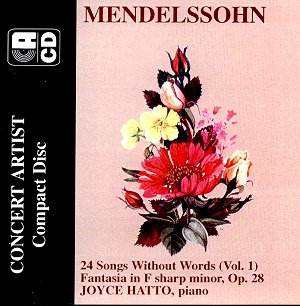Joyce
Hatto doesn’t do things by halves – and neither does Concert Artist
for whom she records. This is the first volume in her complete
recorded edition of the Mendelssohn Songs Without Words and a
more natural, unaffected and musical set you’d be hard pushed
to find. Time and time again the lyrical line emerges unclouded
by a projected self. Time and time again one finds oneself listening
to Mendelssohn as if unmediated. This is musicianship that puts
itself at the service of the composer – something of a pious critical
construct but here apposite indeed.
I
listened to Hatto alongside performances by such as Gieseking
and Moiseiwitsch. The former’s famous 1956 selections stand at
something of a polar opposite to Hatto’s and to compare his slow,
brooding, impressionistic and frequently wounded response to hers
is to move, frequently, from darkness to the light. In the E major,
Op.19/1 the disjunctiveness of approach is at its most acute.
It’s not simply a question of tempo, or of tempo relation, but
it has more to do with a sense, a feeling, the generation of a
sensibility in a few brief intimate minutes. Hatto perfectly judges
this serenade over its broken chords; she is romantic, sensitive,
flowing, Gieseking a crest fallen depressive by comparison. Which
is not to disparage Gieseking, but more to illustrate the difference
in response. With Moiseiwitsch in his 1927 HMV recording there
are differences of another stamp. He opens the A major Op.19/3
as a real call to arms, military and defiant, leaving the smallest
of caesura before driving joyfully on. In comparison Hatto is
slower, rather heavier and more considered with a more obvious
romantic impress. His bombardier left hand accents and stentorian
drama sweeps it all up with gleeful defiance. Hatto sees things
more equably and ends with more than a hint of reflective intimacy.
Again two different interpretations that bring out various shades
of meaning from the text.
When
it comes to the barcarolle thirds and sixths of the G minor Op.19/6
Hatto is wonderfully affectionate, her rhythmic sense special;
Gieseking is once again – a feature of his set – very slow and
drenched in gravitas, rubati impeding the natural rhythm in the
interests of colour and feeling. That Hatto responds to the more
melancholy aspect of these Songs is not in doubt; she just does
it with composer-orientated simplicity. So the F sharp minor rises
and crests with a splendid trill and a sense of chaste intensity
imparted through the most subtle of means. In the E flat Op.53/2
Gieseking suddenly rouses from his slough of despond and his is
a fine reading, as is Hatto’s. And how beautifully she points
the gently dropping fourths in the G major Song that Mendelssohn
dedicated to Clara Schumann and how memorable her noble, spacious
chordal gravity in the E minor Op.62/3. May Song Op.67/4 and the
Spinning Song Op.67/6 have been reversed in the running order
but both are excellent, Hatto revelling in the flighty conversationality
of the writing but savouring, without lingering over, the reflective
but forward moving lyrical impress of the E minor Op.102/1. She
concludes the disc with the Fantasia in F sharp minor. She brings
a clarity shot through with unsettled disturbance to the first
of the three movements and voices the second with effortless naturalness,
a real "composer first" performance.
Joyce
Hatto has performed the set for German radio and it’s a fine thing
that her interpretations are enshrined on disc. One can look to
her in confidence, knowing the value she places on the text is
higher than the need she may feel to project her own personality.
Jonathan
Woolf
MusicWeb
can offer the complete
Concert Artist catalogue

